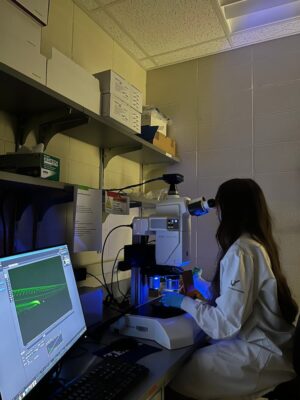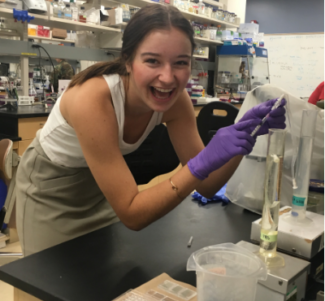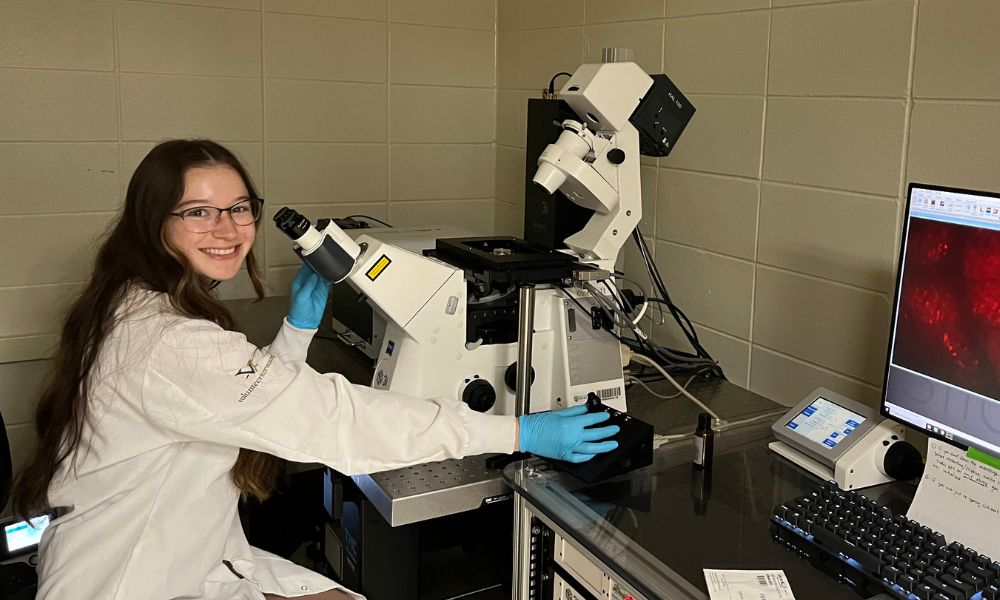Scientist Camden Hoover ‘18 recently earned a highly competitive fellowship from the National Institutes of Health for her investigative work on the role of glial cells in the nervous system.
This three-year research fellowship allows Hoover, a graduate student at the University of Notre Dame, to continue her exploration of microglia cells through research in the lab of Cody Smith, the Elizabeth and Michael Gallagher Associate Professor of Biological Sciences.
For Hoover, “just getting the fellowship has been the most surprising part,” she said.
“These fellowships are funded from the United States congressional budget and are highly competitive and notoriously difficult to get. I underwent nearly two years of application and peer review cycles before finally being selected.”
The National Institute of Child Health and Human Development is funding Hoover’s research, which she described as “truly an honor.”
“This 21-year-old who graduated from Newman with no academic honors or awards never thought she’d be capable of excelling at a national level in science,” she said. “Aside from my own contributions, I credit much of my success to the fantastic mentorship I’ve had over the years from Drs. Jenifer (Jeni) Gifford, Michael Bradley (associate professor of biology) and my current mentor at Notre Dame, Cody Smith.”
Microglia: Pivotal for brain health and disease
Microglia, a specific type of glial cell, are the immune cells of the central nervous system. Not only do they monitor the healthy brain but they also clear debris from the brain and alert the body when the brain needs to be cleaned up, Hoover said.
“During early development, microglia also structure the proper synaptic connections in the brain to ensure that we can think and function properly,” Hoover said. “When microglia go awry, they can contribute to several disorders and diseases including autism spectrum disorders, Alzheimer’s disease and Parkinson’s disease.”
She continued, “It’s critical to understand the fundamental processes by which microglia operate so that we can detect what is going wrong in disease and understand how to restore their proper functions.”

In 2022, Hoover’s lab discovered a novel population of microglia. Hoover and fellow scientists expanded on this research in an article published in “Nature Neuroscience” titled “The embryonic zebrafish brain is seeded by a lymphatic-dependent population of mrc1+ microglia precursors.”
Hoover explained that this population of microglia relies on lymphatics, while other microglia rely on blood.
“I have identified a unique origin for this new population of microglia and potentially uncovered a novel process by which microglia are produced, but you’ll have to keep an eye out for my next publication to hear more details,” she added.
Entering the field of STEM
As a high school student, Hoover longed to be a psychiatrist. She was fascinated by psychology and looked forward to both speaking with patients about their struggles and treating them clinically. So when it came time to enter college at Newman University, Hoover decided to major in biology.
“Sometime during my second year at Newman, I fell in love with research and the critical thinking that research requires,” Hoover said.
Hoover ruled out medical school when she realized the act of memorizing heaps of information wasn’t for her. That’s when she asked her Newman professors about alternative career paths.
“I was introduced to the idea of a Ph.D., which I was told would foster my love for scientific research, critical thinking and creativity in project/experimental design,” she said. “Drs. Gifford and Bradley were monumental in helping me find a career path that was right for me.”
Hoover looked up to Professor Gifford, who at the time was a recent Ph.D. graduate from Notre Dame.
“I decided if Notre Dame could produce such an intelligent, empowering and talented scientist like Jeni then I wanted a chance to be a part of that. I added Notre Dame to the list of schools I’d be applying to.”
In February 2019, Hoover received an offer to interview for Notre Dame’s Ph.D. program. She was one of 50 interviewees who competed for 12 spots in the program. She moved to Notre Dame just two days after graduating from Newman with her Bachelor of Science in biology with an emphasis in biomedical research.

“The science programs at Newman are top-notch, and I felt very prepared when I arrived at Notre Dame,” Hoover said. “Newman was absolutely pivotal for my current research success.”
Hoover credits the science courses and professors at Newman, who “are deeply committed to their students’ success.”
She continued, “My research experiences at Newman greatly prepared me for a career in scientific research by giving me hands-on experience that allowed me to feel confident and comfortable when I entered graduate school. I also took a Newman Studies Program course on the art and craft of happiness taught by Dr. Michael Duxler, which introduced me to mindfulness and meditation, two techniques that are critical to my current success.
“To put it simply, Newman changed the course of my life. I also met my husband at Newman and would not have been able to finish my bachelor’s degree or be so successful in my Ph.D. without his support.”
Newman changed the course of my life.
Camden Hoover
The science programs at Newman are top-notch, and I felt very prepared when I arrived at Notre Dame.
Although women are still “vastly underrepresented in the science, technology, engineering and math (STEM) workforce,” according to Census.gov, the number of female STEM workers has increased from 8% in 1970 to 27% in 2019.
For Hoover, finding exemplary women in STEM was “paramount” to her success, she said.
“I was originally intimidated to reach out to these women for advice or even just to chat, but once I started contacting them — with the help of my professors at Newman — it became clear that there is a large network of women around the world who want to help each other succeed.
“STEM is not an easy field to enter into or continue being successful in. Women in STEM careers know this and are often very willing to chat with trainees. Use the connections you have to reach out to other women in STEM as often as possible.”
Hoover said she welcomes inquiries via email for any aspiring scientists who would like to connect. She is also actively looking for Ph.D.-level jobs in Wichita and is open to any opportunities or connections.
To current students, Hoover offers valuable advice.
“The hard work really does pay off,” she said. “Use the resources and mentors available to you. Show up every day and do your best, even if you’re just doing mundane tasks like taking out the trash. That sort of integrity and work ethic will only ever be beneficial to you in your schooling and career.”
Earn a biology degree
Our program provides the highest quality education and equips you with an array of career options after graduation.

